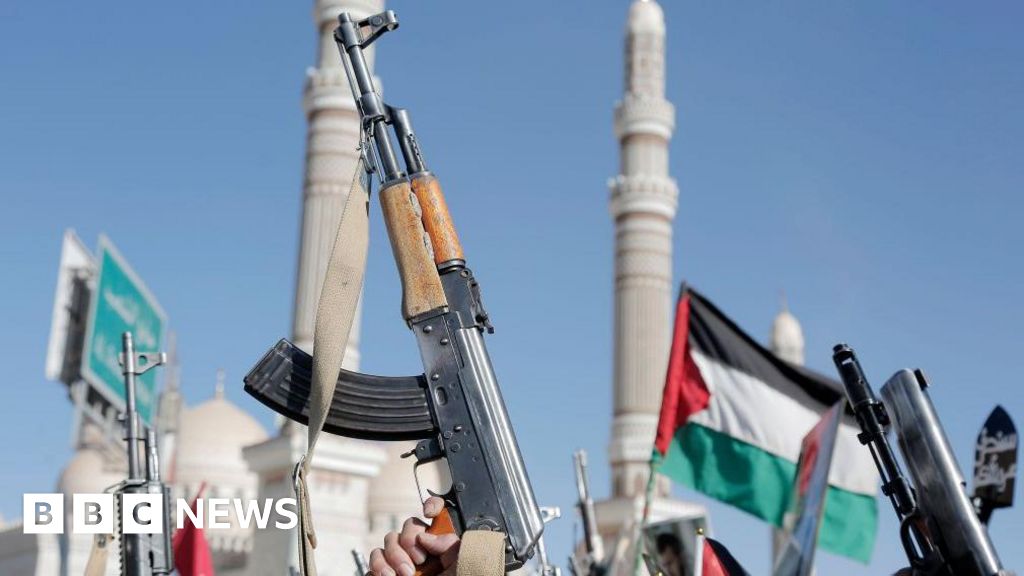ARTICLE AD BOX

Mamun lost 16 of his relatives after they were struck by lightning on the day of his wedding
By Rajini Vaidyanathan
Reporting from Bangladesh
On the day he thought he'd be celebrating his wedding, Mamun buried 16 of his relatives.
They had been killed by lightning on the way to the ceremony.
Dressed in their finest saris and suits, his family members boarded a boat to join Mamun, when a heavy storm struck. As the rain lashed down the boat pulled over and they took shelter under a tin shed on the riverbank, when they were hit.
Bangladesh, which is blighted by extreme weather and heavy storms, suffers an average of 300 deaths by lightning every year, according to the UN.
That's compared with fewer than 20 annually in the United States, which has almost double the population.
It's a heavy burden for the South Asian nation, and for many like Mamun, who is speaking for the first time about what happened on that day in August 2021.
The 21-year-old was getting ready at his in-laws' home in the Shibganj area in the country's north-west, when he heard the crackle of thunder, minutes before he got the gut-wrenching news.
He rushed to his family, where he was confronted with a scene of chaos and confusion.
"Some people were hugging the bodies," Mamun recalls, "the injured were crying out in pain… children were screaming. I was at a loss. I could not even decide who I should go to first."
Image source, Mamun
Image caption,The funerals took place on the evening of Mamun's wedding
Mamun lost his father, grandparents, cousins, uncles and aunts. His mother wasn't on the boat and survived the lightning attack.
"When I found my father's dead body I simply burst into tears. I was so shocked I fell sick," Mamun says.
Later that evening, the funerals of his relatives took place - the wedding feast they were meant to enjoy was instead distributed to the homeless.
Mamun later got married, but says he doesn't celebrate his wedding anniversary as it triggers painful memories. "After the tragic incident, now I am really scared of rain and thunder."
Lightning is a big killer in Bangladesh, claiming more lives annually than floods.
Image source, Salman Saeed
Image caption,Reported deaths and injuries due to lightning have increased greatly in Bangladesh
The number of reported deaths due to lightning has also risen steeply, from just dozens per year in the 1990s.
Nasa, the UN and the government of Bangladesh cite increased storminess due to climate change as a reason for the increase in deadly strikes.
"Global warming, environmental changes, living patterns are all factors for the increasing death toll due to lightning," Md Mijanur Rahman, the director general of Bangladesh's disaster management division, told the BBC.
Such is the seriousness, that the government has added lightning strikes to the official list of natural disasters the country faces which includes floods, cyclones, earthquakes and droughts.
The majority of victims of lightning are farmers, who are vulnerable to the elements as they work the fields through the rainy monsoon months in the spring and summer.
Image source, Salman Saeed
Image caption,Abdullah was wearing his Barcelona shirt when he was struck by lightning
A football shirt, hanging on a rickety fence, overlooking a field in the Satkhira region of Bangladesh is a poignant reminder of one of the victims.
Just days earlier, the shirt had been worn by Abdullah as he went into the vast rice fields to do his day's work.
Now, draped over the wooden barrier, the Barcelona football shirt is singed and frayed, the burnt edges of thread show where the lightning left its mark in May this year.
Abdullah's wife of three decades, Rehana, took me to the field to tell me what happened the day she lost her husband.
It was bright and sunny as Abdullah and a group of farmers went to harvest rice. By late afternoon a heavy storm began, and a lightning bolt struck her husband.
"Some of the other farmers brought him to this roadside shop," Rehana says, pointing to a small shack along the lane. "By then he was already dead."
Image source, Salman Saeed
Back at Rehana's house, the rice Abdullah harvested a day earlier lies in fresh piles outside the small one-room dwelling.
The couple had recently taken out a loan to build a second room to extend their modest home.
Inside, the couple's 14-year-old son Masood is reading a book. With no primary earner, Rehana fears she will be left with a lifetime of debt and wonders how she will pay for his studies.
"The fear gripped me so deeply that now if I see a cloud in the sky, I don't even dare to let my son go outside any more," she says consumed by tears.
Image source, Salman Saeed
Image caption,Rehana says she doesn't let her son outside following the death of her husband
Lightning is a growing concern in other countries too - including neighbouring India which has also seen a rise in the number of strikes in recent years, but a significant reduction in the number of fatalities due to a number of initiatives.
There are efforts in Bangladesh to do more to reduce the number of deaths due to lightning.
Activists say more tall trees need to be planted in remote rural areas to absorb the impact of the strikes, especially in places which have borne the brunt of deforestation.
They also call for a large-scale programme to build lightning sheds, so farmers can take safe shelter, and for broader early warning systems to alert people about possible storms.
One challenge is the poor connectivity and lack of mobile usage in the areas where people are the most vulnerable.
A lack of awareness is also a challenge. Many in the country don't realise how dangerous lightning can be - few people anywhere in the world expect to be hit by a thunderbolt.
Farmer Ripon Hossen - who was with Abdullah the day he was killed - never imagined what lightning would look like up close, until it struck.
Image source, Salman Saeed
Image caption,Farmer Ripon Hossen says he is terrified to work in the open but needs the income from farming
"There was a big loud sound, and then I saw lots of flashing lights," he recalled. "It was as if a disk of fire had fallen on us. I felt a great electric shock and fell to the ground.
"After a while, I opened my eyes and saw that Abdullah was dead."
Ripon can't believe he survived. He says he's terrified to work in the open, but in this impoverished agricultural area farming is the only source of income for him.
"I cry whenever I think of my friend Abdullah," he says.
"When I close my eyes at night, all the memories of that day return like a flashback. I can't console myself."
Additional reporting/stills - Neha Sharma, Aamir Peerzada, Salman Saeed, Tarekuzzaman Shimul

 1 year ago
20
1 year ago
20








 English (US) ·
English (US) ·